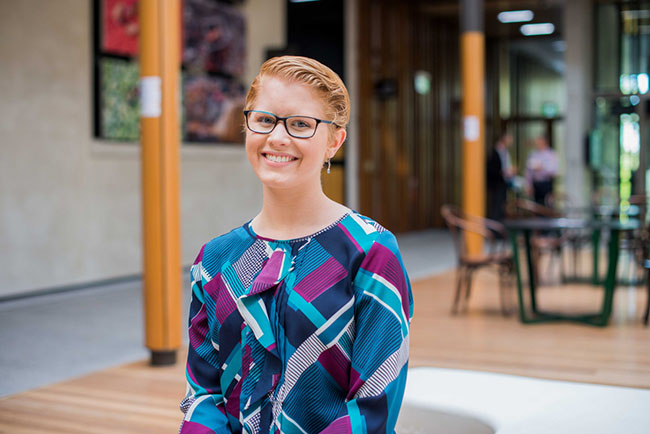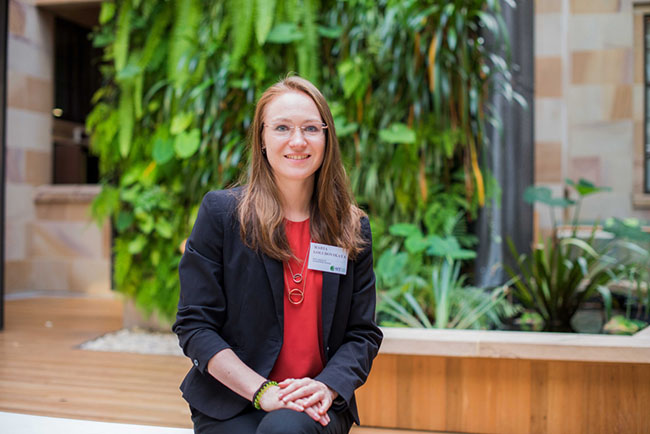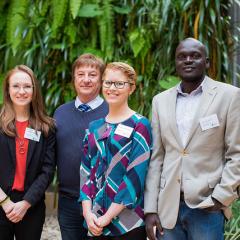 The Three Minute Thesis (3MT®) is a global competition that challenges Research Masters and PhD students to describe their research within three minutes to a general audience.
The Three Minute Thesis (3MT®) is a global competition that challenges Research Masters and PhD students to describe their research within three minutes to a general audience.
We sat down with the BEL 3MT® winner and People's Choice, Jocelyn Bosse (TC Beirne School of Law) and runner-up, Maria Golubovskaya (UQ Business School) ahead of the UQ final to discuss their love of research, their theses, and their thoughts on the value of the 3MT® competition.
Jump to: Jocelyn's profile and video | Maria's profile and video
 Winner and People’s Choice: Jocelyn Bosse
Winner and People’s Choice: Jocelyn Bosse
Jocelyn Bosse is a current PhD candidate at the TC Beirne School of Law. She graduated with a Bachelor of Laws (Honours)/Bachelor of Science and a Diploma in Languages from The University of Queensland in 2017.
Drawing on her academic background of plant science and law, Ms Bosse works closely with the School of Law’s ARC Laureate Harnessing Intellectual Property to Build Food Security project team.
Her thesis, Fragmentation of Access and Benefit Sharing Laws for Biodiscovery in Australia: The Case Study of Kakadu Plum (one component of the team’s diverse research activities) aims to address the impacts of the law on Kakadu plum research and development.
As the BEL 3MT® winner, Ms Bosse will compete in the nail-biting UQ 3MT® final at Customs House on 12 September.
Have you always been passionate about research? What was the lightning bolt moment for you, when you realised you wanted to pursue your PhD?
I think deep down yes, I’ve always enjoyed it, but it took a while for me to recognise that it would be something I would pursue as a career. When I started university, I thought I was going to be a commercial lawyer and go into practice. But after I completed some science research electives, I realised that research was something I was passionate about. I loved the intellectual freedom of it and the excitement of doing something different.
Your thesis will address the real-life impact of IP law and other international regulations on Kakadu plum research and development, and whether these regulations are facilitating productive research partnerships and positive outcomes for all. What inspired you to tackle this research area?
Well, at the intersection of plant science and law, this is an area that has been very contentious for a long time. Most people who work in this area are aware of it, so it was always something that I had on the periphery.
Coming into this project and narrowing my focus for my PhD, I realised that this is an area people have written about, but no one has gone out in person to talk to the key players. No one has looked at the actual process and how it affects researchers and Indigenous communities – how different voices are perhaps being amplified or not being amplified – and gained an understanding of what’s happening on the ground.
I was inspired partly out of curiosity, but I also realised that it’s becoming more and more of a practical issue because as new laws and regulations are being developed internationally and domestically, they’re having a substantial effect on Kakadu plum research. It must be addressed soon.
What is new and different about your approach to this research? What are you doing that is unique?
Part of it is just going out and talking to people from various communities and different walks of life to understand all the perspectives on these regulations, and not just looking at one side of the negotiations or one point of view, but really seeing how everyone conceptualises what they’re doing and what they’re hoping to achieve…and perhaps looking at how the law is either helping or hindering them from getting to that point.
What would you say are the key findings from your research thus far?
It’s still early; I completed my PhD confirmation a month ago! I’ve done a lot of literature review and some preliminary interviews, but the bulk of my fieldwork is yet to come.
What is the potential positive impact of your research?
I think that by going out into the field and highlighting what’s actually going on, it will illustrate where the focal points are in these processes that are creating issues, and why it is that so many of these access and benefit sharing agreements, contract negotiations, and projects have run into massive issues so that we can fix these processes. It’s not necessarily just about changing legislation, it may be about changing university policy, or the approaches taken in interacting with Indigenous communities. My research will hopefully determine where those issues are arising so that we can then resolve them or rethink our approach entirely.
What has been the most challenging and the most rewarding aspect of pursuing your thesis so far?
I think the answer to both of those questions is the same: learning about ethnographic methods. It’s not something that I was well versed in when I came into the PhD program; it was a very steep learning curve, but because I‘ve had to learn so quickly it’s been equally rewarding and challenging.
Thankfully, I’ve had some great support from my supervisors. The first six months of my PhD, I joked that my whole brain had to be reconfigured. It can be painful but the growing pains are a good thing.
What’s next for you after you finish your thesis and receive your PhD?
At this stage, hopefully academia. I’m pretty committed to staying in research; I’m enjoying it. I’m also hoping to take on more teaching responsibilities, but research is definitely where the passion is.
What did you enjoy most about the 3MT®, and how did you benefit from it both personally and professionally?
It was interesting to hear about what other PhD candidates are doing, especially because I don’t interact often with people in the Business School. Even people in my own School – I know vaguely what they’re working on but it was fantastic to learn more.
The competition helped me unpack my own research and work out how to communicate what it is that I’m doing in a very short time frame to people who aren’t in my field. Now I have something I can go to as a framework to explain it really quickly – I have my elevator pitch ready!
What would you say to encourage your fellow HDR students to participate in future iterations of the 3MT® competition?
It’s a great opportunity to take stock of what you’re doing as a PhD candidate, because I find that it’s easy to get bogged down in the details and forget about the importance and the implications of your work. You sit down and say ‘actually, I am doing something that’s very useful’, because you’re forced to think about how it affects other people.
Watch Ms Bosse's winning BEL 3MT® presentation:
Runner-up: Maria Golubovskaya
 Maria Golubovskaya is a current PhD candidate and an Associate Lecturer in Tourism at UQ Business School. Originally from Moscow, she arrived in Australia in 2012 and completed her Master of International Hotel and Tourism Management at UQ in 2013.
Maria Golubovskaya is a current PhD candidate and an Associate Lecturer in Tourism at UQ Business School. Originally from Moscow, she arrived in Australia in 2012 and completed her Master of International Hotel and Tourism Management at UQ in 2013.
Ms Golubovskaya’s PhD, Tourism and hospitality youth employment, focuses on young, adolescent workers in the hospitality industry, and explores the way early work experiences shape youth development. Unlike other studies, her research seeks to hear directly from youth by giving them a voice, to understand their perceptions of work and its influences on them. She expects to finish her PhD within the next two years.
As the BEL 3MT® runner-up, Ms Golubovskaya went on to compete in the UQ 3MT® Wildcard competition on Wednesday 22 August.
Have you always been passionate about research? What was the lightning bolt moment for you, when you realised you wanted to pursue your PhD?
I never imagined myself ending up in academia, but I was always interested in puzzles, solving problems, and finding answers to questions. However, because of the amazing people I’ve met and the opportunities that have come my way, gradually I found myself here.
Your PhD focuses on how young, adolescent workers perceive work and how they develop personally and professionally as a result of their work experiences. What inspired you to focus on this topic?
Partially my own experience working in the hospitality industry, where I often worked with younger people, mostly kids in high school. When I worked alongside them I noticed differences in perceptions and interpretations - things that were to me common sense, were not so for them. They are also quite open about some of their frustrations and problems at work, which helped drive my curiosity to understand more about their feelings about work and fuelled my research. Interestingly, I was initially tasked to study the organisational perspective of youth at work, as part of a larger research project my supervisors are involved with. But I kept coming back to the young people and their stories and experiences. So I convinced my supervisors that studying the way work affected them was still in the spirit of their research, but from the perspective of the youth.
Also, I’m quite lucky in that the Queensland Tourism Industry Council, Queensland’s peak body for the tourism industry, agreed to help fund my PhD. They have been very supportive because they intrinsically understand the importance of young people to the tourism industry. The fact that industry is so interested in the outcomes of my research project shows me the practicality and the significance of what I’m doing, which helps to reinforce that passion in me.
What is new and different about your approach to this research? What are you doing that is unique?
Believe it or not, there has been very little prior research out there that asks young people themselves ‘what do you think?’ about work, and aims to capture their interpretations.
But beyond that, I’m also excited to be using diverse research methods. Not only am I talking to young people, but I’m also talking to people in their lives who know them quite well, because young people aren’t necessarily self-aware and they often lack articulation skills to be able to explicitly say what they think even if they want to. So I have each young participant refer me to a group of others who knows them well, whether it’s a teacher, a parent, their boyfriend or girlfriend, or a friend, and then I come back to the young person to clarify some of the things I’ve heard from those significant others. In this way, I’m getting more diverse and rich perspectives.
What would you say are the key findings from your research thus far?
I have conducted preliminary analysis on the first part of my study, and there are some fascinating themes rising from the data.
We tend to think that young people work just because they want a bit of cash. What we often underestimate is what a job represents in a young person’s life. I am amazed to learn the extent to which their jobs are critical spaces in their lives, regardless of how many hours they worked – whether it was two or 30 hours per week.
I am finding that work can break or dignify a young person. It can make them question their confidence, or become completely repelled by the industry based on some of their managerial and peer experiences within their workplace. But it can also have the opposite effect. A job can dignify a young person and help them believe in themselves. It can help find them their ‘home’ or help them discover who they are from a completely new perspective.
From a managerial perspective, it’s a departure from thinking of a young person as someone who you pay to work and who will leave you in two years, versus someone who you can positively influence and change for the rest of their life. I’m hoping if we take this thinking back to industry, it will enable them to have a different mindset on youth employment.
What is the potential positive impact of your research?
I haven’t yet done the quantitative study to establish some empirically proven links between workplace practices and youth development, but based on the qualitative data, I believe a new industry mindset could positively affect young people in many ways, particularly their confidence and self-esteem. We also tend to undermine the importance of soft skills, but these skills – such as emotional intelligence – are often the most transferable outside of the workplace. If employers can help young people build up these soft skills, it could help with their development.
In terms of organisational outcomes, if a young person feels more confident and capable, they should become more engaged as a worker. The performance and the quality of work they are doing should improve. If a young person feels like an organisation cares about them, they’re also more likely to stay loyal and committed to the job in the long term.
Of course, there are also opportunities to help government develop better policies to cater to young people in the workforce.
What has been the most challenging and the most rewarding aspect of pursuing your thesis so far?
The most rewarding is the fact that I’ve been able to follow my passion the whole way through. I was true to myself in that I went down the path I wanted to go down, not necessarily what industry or my supervisors wanted me to do. So far, I’m fascinated by my studies and the conversations I’ve had. That I’m able to convince others of the importance of the study and the significance of the findings is very rewarding in itself.
The most challenging aspect is perhaps meeting deadlines. Because it’s my passion project and such a rich topic, it’s hard not to worry about timing versus quality. I still want to meet my milestones but I also don’t want to jeopardise the quality of my research.
What’s next for you after you finish your thesis and receive your PhD?
Time will tell. The work I’m doing is transferable: it will increase my knowledge but also give me great research skills which I can use in multiple different areas. All I know is that I’ll follow my passion and keep doing something meaningful, whether that means staying in academia, researching within this area and contributing to the knowledge base, or working for government and transferring what I’ve learnt to help them develop policy, or doing something entrepreneurial.
What did you enjoy most about the 3MT®, and how did you benefit from it both personally and professionally?
I enjoyed the exercise of having to communicate what my thesis was about in very general and succinct language. The 3MT is great for your research portfolio, but it’s also an opportunity to see whether you can convince others of the importance of what you’re doing, and whether you understand it well enough to be able to explain it in a short amount of time to a broader audience.
What would you say to encourage your fellow HDR students to participate in future iterations of the 3MT® competition?
It’s a win-win situation and a great exercise for any researcher. To be able to come up with a pitch and stand up there, you expose yourself to an extent but you gain so much in the process. You can win and end up with some research funding, but even having a video of your presentation is quite valuable. You learn so much by watching yourself back and seeing how you would present differently next time. You could even use it to pitch your research to potential industry or academic partners.
Watch Ms Golubovskaya's BEL 3MT® presentation:




